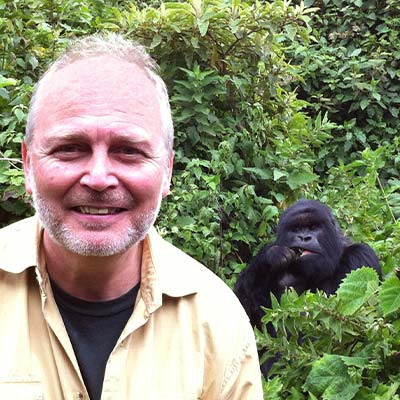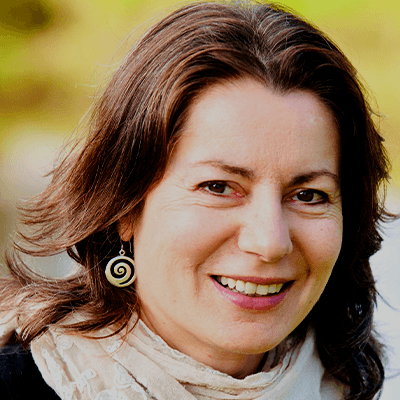Nature and Travel Writing
MA
Postgraduate degree
For any writer inspired by the natural world, other cultures and the power of place.
- A world-leading course in two powerful genres dealing with today’s greatest challenges.
- Offers you the skills and experiences to become a published writer of books, articles and online.
- Taught remotely and part-time over two years, to fit around your lifestyle.
Do you enjoy writing about the environment, your travels, encounters with wildlife, people and places past and present? Would you like to become a working writer, or to enrich your writing for pleasure?
Today’s writing about nature and travel welcomes all of those themes and more, and in this unique and inspiring Nature and Travel writing degree course we will look at the potential of your writing and of these dynamic genres – including where they overlap with memoir, history, culture, science, wellbeing and other genres in today’s marketplace.
Over two years of mainly evening sessions, you'll be immersed in the world of great nature and travel writing, with talks from top authors and editors, seminars from our seasoned tutors, creative friendships with your peers and an exploration of both the classics and the cutting edge in our genres.
You'll write extended pieces of up to 4,000 words, essays on critical topics, and a final Portfolio of up to 18,000 words. You'll also learn about the commercial aspects of getting published, organising writing trips, establishing an online presence and building a writer’s career.
A highlight of the course is our practical approach to becoming a working writer. This includes making actual pitches to real newspapers and magazines, based on an independent field trip which you will make in order to experience writing on the road for real.
By the end of the course, you'll be prepared to operate as a professional-quality writer in our genres. By then, many of our students have already appeared in highly respected newspapers, magazines and websites.
Our graduates have been widely published, including by Penguin Books, Bloomsbury, Granta, Bradt, National Trust and others. Their prizes have included the Stanfords New Travel Writer of the Year, BBC Countryfile’s New Nature Writer of the Year, the Nature Writing Prize for Working Class Writers, the Footnote x Counterpoints Writing Prize, and short/longlists for the Wainwright Prize for Nature Writing and the Richard Jeffries Prize.
A thread running through the course is the creative journey that each student is making, which is different for each person. We support that with a Personal Journey project that supports your individual vision for who you want to become as a writer.
Our students come from all backgrounds, ages and levels of experience and skill. Some want to build a writing career and others are happy with a life-affirming hobby. We welcome all of these and see them as contributing to the richness of our learning and writing.
The 2025-27 course begins on 30 September 2025, with a three-night in-person residential event in Bath (30 Sept-3 Oct), for which you will need to find your own accommodation. After this, it will be taught online, usually on weekday evenings, and will end in September 2027. There is no formal teaching in the months of July, August or September.
What you'll learn
We aim to give you the skills and knowledge to become a working writer, alongside an understanding of current issues in our field.
You’ll study:
- Exemplary writers in our genres and what you can learn from them
- The history and context of contemporary and historical nature and travel writing
- Issues in non-fiction, including representation, writing from reality, presenting issues and transforming lived experience into compelling stories
- How your own writing works and where you want to take it.
Writing in the Field (30 credits)
An introduction to writing about nature, place, people and landscapes ‘in the field'. This module is designed to give you a sense of what travel and nature writing is about and how to polish your craft. It begins with an intensive residential event with outdoor and indoor workshops focusing on practical writing, fieldwork and the creative possibilities of our genres. This is followed by a trimester of online seminars introducing the basic building blocks of writing in the field.
Context, History and Genres in Creative Non-Fiction (30 credits)
An overview of the context and history of relevant areas of creative non-fiction and what you can learn from them as a practitioner. It aims to provide you with a deeper understanding of the conventions and possibilities in various genres such as travel, nature, memoir, popular science, history and others.
Advanced Travel and Nature Writing (30 credits)
An advanced approach to travel and nature writing literature, professional practice and independent projects. This module is designed to build your understanding of how to apply your writing skills to the disciplines of format, genre and the marketplace. It pushes you to experiment with these, both to learn their conventions and to challenge their limitations.
Professional Skills in Travel and Nature Writing (30 credits)
A module designed to develop business, organisational and writing-related skills, improving your pathway to getting published. This module is designed to apply the experience of previous modules to a potential career plan. You will learn about the markets for travel and nature writing and undertake a short solo writing trip, from which you will pitch stories to real media outlets. Success in this can begin to establish your career as a professional writer by getting articles published. You will also learn about the practicalities of building a freelance business model.
Portfolio and Reflective Journal (60 credits)
The Portfolio is a 16-18,000 word anthology of your creative writing in our genres, with an accompanying Reflective Journal examining your progress through the course and future plans. Collectively these help to establish personal momentum and a professional career. The content is refined through a series of three in-depth supervisions during your final summer.
This course includes or offers the following modules. Please check the programme document for more information on which modules are core, required or optional.
- Writing in the Field
- Context, History and Genres in Creative Non-Fiction
- Advanced Nature and Travel Writing
- Professional Skills in Nature and Travel Writing
- Portfolio and Reflective Journal
You’ll be assessed through a combination of formative and summative assessments. This will include creative writing pieces, critical and analytical essays, presentations and a broad portfolio of your writing.
This course is taught remotely, with students attending online from wherever they live in the UK or overseas. Most classes are held in the early evenings, to allow for students’ other commitments such as work and family.
At the start of Year 1 we bring everyone together for an intensive residential event in Bath, which gives you a chance to get to know your peers and tutors, and to experience some guided writing in the field. Please note that you'll have to pay for your own costs for this event (travel, accommodation, subsistence).
Teaching is mainly through seminars and lectures, including a wide range of guest speakers. There are also one-to-one sessions with your tutors.
To find out more about how we teach and how you'll learn, please read our information on Your Learning and Teaching at BSU.
Opportunities
In Year 1, the opening residential event includes fieldwork opportunities followed by related writing exercises. In Year 2, the second trimester revolves around a 5-10 day writing trip that you'll organise and undertake in the UK or overseas, usually in April/May. We also encourage you to develop a fieldwork programme of your own.
You’ll have the opportunity to make connections with key practitioners and commissioners in your field, though no formal internships are available.
Develop a wealth of indispensable digital skills that you can take into your future career. One of only three Adobe Creative Campuses in the UK, we provide all Bath Spa students with access to the full Adobe Creative Suite, giving you the tools to communicate creatively, whatever your course or chosen professional field.
Facilities and resources
The course is low residency, so apart from the residential event, you'll be taught online.
The course is taught:
- Online using Teams and our Virtual Learning Environment.
- Through a residential event in the UK.
Fees
| Student | Annual tuition fee |
|---|---|
| UK part time | £4,733* |
| International part time | £9,220* |
Fee notes
*This course is studied part-time and remotely over two years, with tuition fees payable in both years of study.
Additional course costs
You may need to pay additional course costs over and above your tuition fees, for example, for specialist equipment or trips and visits. Please check the course Programme Document (linked under the main image on this page) for details of any additional costs. You can also read our Additional Course Costs Policy for further information.
Funding opportunities
Please visit our Funding pages for an overview of the funding options that may be available, including scholarships and bursaries.
Interested in applying?
We’re looking for individuals with:
- A real passion for either the natural world and/or places and people
- A love of travel and/or nature writing
- Above all, an urge to write and be published.
Ideally you should have a first degree (for example, BA/BSc), but this is not compulsory, depending on your other experience. See our Accreditation of Prior Learning (APL) web page to learn more.
Ready to apply? Click the 'apply now' button in the centre of this page.
Need more guidance? Head to our how to apply webpages.
Interviews are held online through the year, on a first-come-first served basis. Please submit two to four pieces of your writing before the interview, ideally showing an ability to write non-fiction narrative or feature journalism.
We assess international students on the same basis as domestic students. We welcome the richness of experience that having students from many countries and backgrounds brings to the course.
In terms of English proficiency, it's important in creative writing to have sufficient grasp of nuance and connotations for meaningful discussions of, for instance, exact word choices; however, it's not a problem to need minor assistance – for example, with the odd bit of rephrasing or problems with prepositions.
English Language Requirements for International and EU Applicants:
This course requires an IELTS test (or equivalent) with an overall grade of 7.0 and with no less than 6.0 in each component.
When to apply
Many of our postgraduate courses have a limited number of student spaces. To avoid the disappointment of the course being full, we recommend that you apply now.
Late applications (generally those made after 31 July) will only be considered if places remain on the course.
Need more information or still have questions? Contact us to discuss your situation.
Programme leader: Jonathan Lorie
Email: j.lorie@bathspa.ac.uk
- Award
- MA Nature and Travel Writing
- School/s
- School of Writing, Publishing and the Humanities
- Campus or location
- Low residency
- Course length
- Two years part-time.
Entry requirements
We’re looking for individuals with a real passion for either the natural world and/or places and people, plus a love of travel and/or nature writing.
Above all, you should have an urge to write and be published.
Ideally, you'll have a first degree, but this is not compulsory, depending on your other experience.


